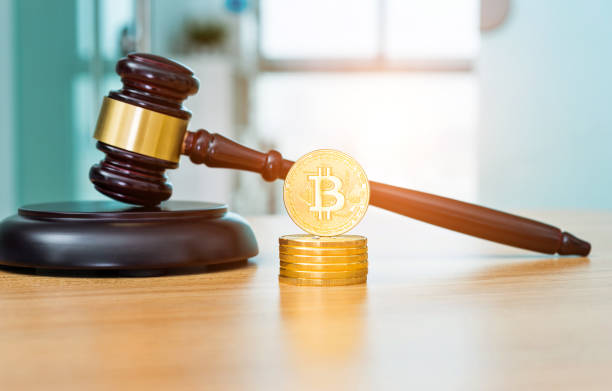Introduction:
Blockchain technology has transformed various sectors, and one of the most profound impacts is in the realm of global legal frameworks. As blockchain continues to develop and disrupt traditional systems, its integration into legal processes is becoming increasingly vital. From improving transparency to enabling secure transactions and revolutionizing contract enforcement, blockchain is reshaping the landscape of legal systems worldwide. This article explores how blockchain is influencing global legal frameworks and why it is poised to become a cornerstone of future legal practices.

Understanding Blockchain and Its Role in Legal Systems
At its core, blockchain is a decentralized ledger system designed to securely record and verify transactions across a network of computers. Unlike traditional databases, blockchain’s decentralized nature removes the need for a central authority, ensuring that data is immutable and transparent. These features are crucial in the legal domain, where ensuring the integrity and authenticity of documents and transactions is paramount.
In the context of legal frameworks, blockchain offers solutions to age-old problems such as fraud, document tampering, and delays in legal proceedings. It provides an open, verifiable, and tamper-proof system for recording legal documents, contracts, and transactions, making the legal processes more secure and transparent.
Smart Contracts: The Future of Legal Agreements
One of the most significant contributions of blockchain to legal frameworks is the introduction of smart contracts. A smart contract is a self-executing contract with the terms of the agreement directly written into lines of code. When predefined conditions are met, the contract is automatically executed, eliminating the need for intermediaries and reducing the chances of disputes or breaches.
Smart contracts are already being used in sectors like real estate, finance, and supply chain management, and their use in legal systems is growing. These contracts are not only efficient but also provide a higher degree of certainty and trust, as they are automatically enforced without human intervention.
Decentralization: A New Era for Legal Systems
Decentralization, a core principle of blockchain technology, is gradually finding its place within global legal frameworks. By removing the reliance on central authorities or intermediaries, blockchain enables peer-to-peer interactions that are transparent and secure. This shift is particularly beneficial in countries where corruption or inefficiency in legal systems is rampant.
Blockchain’s ability to decentralize legal processes, such as contract execution, dispute resolution, and evidence verification, means that individuals and organizations can transact with a higher degree of autonomy. Moreover, this decentralization ensures that all transactions are equally visible to all parties involved, reducing the possibility of fraud or manipulation.
Enhancing Regulatory Compliance with Blockchain
In an increasingly complex global legal environment, regulatory compliance is a critical concern for businesses and individuals alike. Blockchain technology can streamline the compliance process by providing a transparent, immutable record of all transactions. This can simplify audits, track the flow of goods, and ensure that companies comply with regulatory standards in real-time.
For instance, in industries like finance, healthcare, and supply chain, blockchain can be used to track and verify regulatory compliance at every stage. By using blockchain, businesses can create more trustworthy and transparent systems that meet legal and regulatory requirements without relying on cumbersome paperwork or manual audits.
Blockchain and Digital Identity: The Future of Personal Data Management
Blockchain’s potential to secure digital identities is another area where its impact is being felt in the legal domain. Digital identity management is a growing concern, as cyber-attacks and data breaches continue to increase. Blockchain offers a secure way to store and manage personal data, providing individuals with full control over their identities.
Through blockchain, personal data can be stored in a decentralized way, ensuring that no single entity has complete control over sensitive information. This could radically change how legal systems handle personal information, reducing risks associated with identity theft, fraud, and data misuse.
Blockchain and Cross-Border Legal Transactions
Another area where blockchain is significantly impacting global legal frameworks is in the realm of cross-border transactions. Blockchain enables secure, instantaneous, and low-cost transactions across borders, reducing the complexities involved in international trade, law enforcement, and financial transactions.
For example, blockchain can facilitate the smooth transfer of assets between different legal jurisdictions without the need for costly intermediaries. This capability is especially important as global trade and international agreements become more complex, and the need for quick, efficient transactions increases.
Regulation and Governance: The Need for New Legal Frameworks
While blockchain offers numerous benefits, it also presents significant challenges for global legal systems. The decentralized nature of blockchain makes it difficult to enforce traditional regulations and legal standards. In many jurisdictions, blockchain-based transactions are not yet fully recognized by law, and legal frameworks must be adapted to accommodate this technology.
Governments and international organizations are already beginning to address the regulatory challenges posed by blockchain. Countries like Switzerland, Estonia, and Singapore have been pioneers in developing blockchain-friendly regulatory frameworks, providing clear guidelines for the use of blockchain in legal transactions. However, the global nature of blockchain requires international collaboration to establish a unified approach to regulation.
Blockchain’s Role in Conflict Resolution and Arbitration
Blockchain also holds great promise in the field of dispute resolution. Traditionally, legal disputes are resolved through courts, which can be slow, costly, and inefficient. With blockchain, however, alternative dispute resolution (ADR) methods, such as arbitration and mediation, can be automated through smart contracts.
In situations where legal conflicts arise, blockchain-based systems can provide automated arbitration, ensuring that the parties involved can resolve their issues quickly and fairly. This could dramatically reduce the burden on courts and allow legal systems to focus on more complex cases that require human intervention.
The Future of Blockchain in Legal Frameworks
As blockchain technology continues to evolve, its integration into global legal systems is likely to deepen. The potential for blockchain to transform legal practices is vast, from simplifying compliance processes to enhancing transparency and accountability. However, for blockchain to reach its full potential in the legal domain, it is crucial for legal frameworks to adapt and evolve in tandem with technological advancements.
While the adoption of blockchain in legal systems is still in its early stages, the future looks promising. With the right regulatory measures in place, blockchain could reshape global legal frameworks and create a more efficient, transparent, and trustworthy legal environment.
Conclusion
Blockchain technology is undeniably shaping the future of global legal frameworks. From enhancing transparency and regulatory compliance to facilitating smart contracts and improving cross-border transactions, blockchain has the potential to revolutionize legal practices around the world. As the technology continues to mature, legal systems must adapt to its growing influence, ensuring that the benefits of blockchain are fully realized in the legal domain.

Thank you for your sharing. I am worried that I lack creative ideas. It is your article that makes me full of hope. Thank you. But, I have a question, can you help me?
Can you be more specific about the content of your article? After reading it, I still have some doubts. Hope you can help me.
Thanks for sharing, your article helped me a lot. I hope your article can help more people, so I will reprint your article to my site, do you think it is appropriate? If you allow it.
Thanks for sharing. I read many of your blog posts, cool, your blog is very good.
I don’t think the title of your article matches the content lol. Just kidding, mainly because I had some doubts after reading the article.
Your point of view caught my eye and was very interesting. Thanks. I have a question for you.